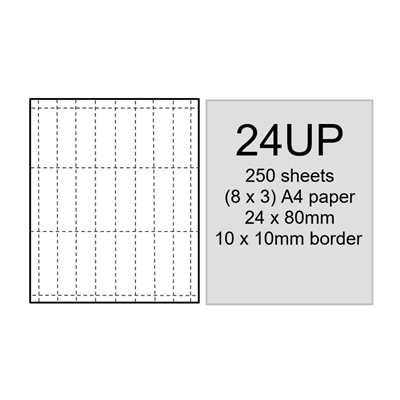So You Think Your Product Is Finished – Understand The Effectiveness of Professional Product Labelling

The importance of labelling on products cannot be overemphasised. When purchasing consumer goods, checking the label is often the final step in the buying process. A quality label could make all the difference in whether you get the purchase or not perforated printer paper.
It’s also the first contact point after the sale, assisting customers to use your products in a proper manner. However, how does the process of labelling your product work? And how can you enhance the impact of your custom labels australia?
Use Label Design To Draw The Attention Of Customers
Customers are likely have an idea of what they’d like to buy by time they’re on a store shelves. Therefore, it’s crucial that your labels communicate clearly what your product can do to satisfy an issue or a desire.
Use Your Strategic Thinking To Stand Out
The proper label design will draw the eye to your product. A colourful, vibrant label can make you stand out in the midst of dull packaging. Similar to minimalist designs or neutral colours can make you stand out you are surround vibrant custom labels australia.
The overall look and the selection of colours could also relate to the kind of product that you’re offering. For instance, the more processed food an item is, the label will appear. Look at the snack aisle next time you are at the supermarket.
The organic and natural products tend towards neutral colours and fonts that mimic handwriting, as well as simple illustrations or artwork. Check out cheaper, less processes, market snacks and you’ll find bright colours, designs, and photo elements that have been heavily.
Be sure to mention the reasons that your product is superior over the other. Does your product offer particular health advantages? Are you able to find it in a bigger size than the competition? Are you able to use it more easily? If your label places your strengths in the forefront this gives the customer an incentive to purchase the product and study further.
Strengthening Brand Identity
Good label design and packaging can also help to reinforce your brand’s image. If a customer already enjoys any of your items, they’re more likely to prefer your brand to brands that are competing in different product categories.
Consistency in branding and theme allows customers to find products they’ve had experience with. However, this doesn’t mean that each label for a product must be the same colour scheme, but you must remember that consistency is a key factor in building brand recognition.
The Ingredients And Health Risks
For their safety, customers need to aware of the ingredients include in the products they purchase. Cosmetics, food items and pharmaceuticals have to legally include specific information about the product (e.g. the ingredients in the item) included on their perforated printer paper. Likewise, chemicals must have warnings on hazards and the best way to manage these hazards and how to deal with them.
What is the impact of this in real life? About 10 percent of Americans suffer from a food allergy. To make it easier for people with allergies to avoid harmful products, the regulations demand explicit labelling for common allergens such as eggs, soy, and peanuts. The language and location are consistent across different products, making the dangers simple to spot and be aware of and avoid.
Take an examination of the FDA’s latest final decision on the issue of labelling gluten-free foods. These rules are intende to assist the 3 million Americans with celiac disease. For people with the condition, eating gluten may cause an immune reaction that could lead to chronic disease.
Although it’s evident that wheat bread has gluten, the protein is found in a wide variety of other non-grain-based foods that range from snack chips and soy sauce. Incorporating “gluten free” on the labels of products helps people with celiac disease to find foods that are safe.
The new regulation states that the product may identifies as “Gluten Free” If it meets any of these three requirements:
- It is free of gluten-containing grains, or ingredients made from gluten-containing grain.
- Gluten eliminated from gluten-containing food items and results in total gluten content that less than 20% parts per million
- The quantity of gluten-containing ingredients is so low that the amount of gluten contained in the product is lower than 20ppm.
Instructions And Hazards
In the best case, misinterpreting the intended purpose of a product can result in negative outcomes. This can result in an unsatisfactory experience and a negative opinion about the item. In the worst case, misuse could result in injury, damage or even death.
Instructions should contain all of the necessary information about the product’s use, along with responses to the most frequently asked questions. For instance what time does glue or paint need to completely dry and cure? How long can an item of food remain acceptable after the container has been open? When will the additional dose be administered? The answers to these questions on the label can help avoid errors in use.
To prevent confusion, regulatory agencies develop uniform ways of communicating this information to buyers, in the fields that are required within the perforated printer paper. Chemical products must be labelled; this is complying with the Globally Harmonised System of Classification and Labelling of Chemicals (GHS.)
Labels that comply with GHS provide the information about hazards and identification for the product in a format that is simple to comprehend and refer to. The medicines that are sold in America are required to carry an Drug Fact label, which provides information on the use and dangers in a simple format that is easy to follow.
Good idea provide a web address or a phone number that customers can find answers to queries regarding products. This will help prevent confusion that could cause dangerous mishaps.
Monitoring Products From Production To Consumption
perforated printer paper Shelf Talkers allow you to monitor containers throughout their entire lifespan from the moment of production until disposal by the consumer and help in solving issues that could occur throughout the lifespan of a product:
Labels can help organise the warehouse process by keeping records of exact number and location of each SKU in stock.
Bills of Lading and shipping labels are a breeze to move a container through the logistics system. They typically contain machine-readable barcodes, as well as simple text, so that staff and equipment can recognize the container.
The addition of batch numbers and lot numbers allows you to identify the product even after sale. This is helpful for keeping track of products that might require recall.
Labels As A Safeguard Against Counterfeiting
Custom labels also offer the best way to safeguard your brand’s image by preventing counterfeit products. Labels can aid in identifying authentic products by making use of serial numbers and random lot numbers, label destructibility, and even hard-to-copy labels.
Branding products using trademarks and registered logos allows you to legally eliminate counterfeits from the market. This helps buyers and resellers identify counterfeit products, and can also protect your business from public relations and liability concerns when counterfeit perforated printer paper are harmful to consumers.
Sensory Label System for Pressure
Pressure sensitive labels offer the possibility of changing the label to meet changing requirements without having to change your equipment for labelling. Even a basic device like CTM’s 360a Series Wrap System (WR) offers a variety of functions and is able to apply a variety of labels, no matter if they’re clear, metallic or coated with special materials to resist environmental conditions.





